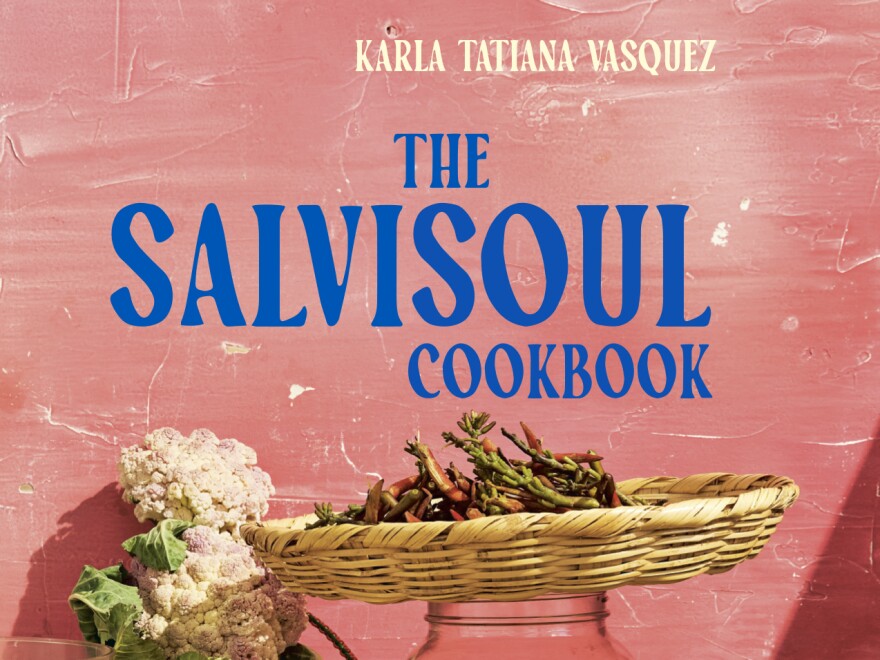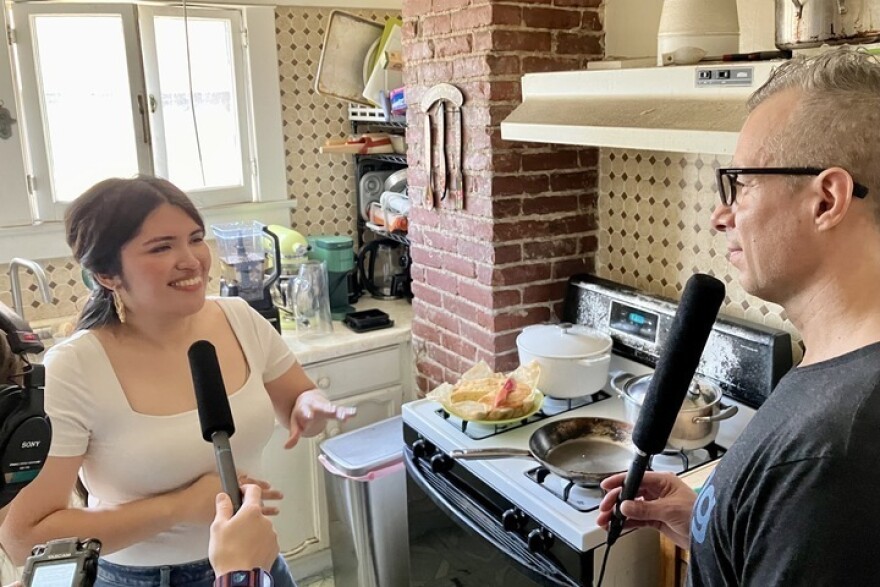About a decade ago, Karla Tatiana Vasquez tried learning how to make her favorite dish: salpicón salvadoreño, a beef salad with radishes, mint, lime and salt.
Vasquez, a trained chef and food writer, was born in El Salvador, moved to Los Angeles as an infant, and grew up eating food from her homeland. She thought it would be easy to find recipes.
"I went to the internet and I did a Google search and I found two books, which I thought immediately I was like, 'Wow, this is absurdo,'" Vasquez said.
It felt absurd to her because there are more than two and a half million Salvadoran people living in the U.S. Many fled the small Central American country during a brutal civil war that lasted more than a decade and ended in 1992. Others left to escape extreme poverty and political instability in the aftermath of the war. That history of mass migration got Vasquez thinking that she needed to do something to safeguard Salvadoran culture.
Her idea became SalviSoul, a platform launched in 2015 dedicated to preserving her traditional food culture through stories, cooking classes, recipes. And now, that mission has turned into The SalviSoul Cookbook: Salvadoran Recipes and The Women Who Preserve Them. Publishing April 30, it's the first U.S. cookbook focused on Salvadoran food from a major publishing house.

One of the recipes she collected is a Salvadoran version of the spiced grain-based beverage horchata. On a sunny day in the Adams-Normandie neighborhood near downtown Los Angeles, Vasquez walked NPR's A Martinez through how the drink is prepped.
"We will toast this medley of seeds. And after they've been toasted, we put them in the blender. We strain it, and then we sweeten it." she said, "Almost everything in life is better toasted, I think."
As Vasquez darted back and forth in her kitchen, she said that the book started coming together through her desire to interview the women in her family and learn their recipes.
But when friends heard about her project, they were excited to share recipes and stories from their families. She started seeking stories and recipes from her community and got responses from around the world.
"I wasn't expecting to get people calling me from like Minnesota writing me emails from Paris." she said. "Like there were people as close as like Crenshaw District, as far away as people in Abu Dhabi."

She always knew there were a lot of Salvadorans in Los Angeles, but this was the first time she got an idea of how far-flung the diaspora extended beyond the city. The interviews she collected became The SalviSoul Cookbook, with 80 recipes from 25 matriarchs.
"The way that I absorbed the culture was through the women in my family and they fed me." They also shared lessons on life and love." So there was the food that nourished my physical form. And as I was at the table, these stories were nourishing the part of my soul that longed to connect, that longed to belong."
Vasquez toasted a mixture of Moro, sesame and squash seeds with cinnamon and cacao pods in a pan on the stove as she recounted to NPR stories she heard around her family's dinner table.
The smell around her was almost like popcorn, but with a deeper richness.
Vasquez struggled to convince agents and publishers her project was worthwhile. They told her they didn't think there was interest among the wider American public.
"There were other agents I wrote to who said, 'Well, Karla, who are you? Do you have a restaurant? Do you have a very big Instagram page or a very big YouTube presence?'" She also faced pushback in her own community. "I had some Salvadorans themselves say, "Girl, don't bother. Like all we have is pupusas. All Americanos want are our pupusas."
But it was the words of her grandmother Lucy that cemented her resolve: "Esto se trata del legado de la mujer Salvadoreña."
"She said 'This is about the legacy of Salvadoran women.' And she set the standard then and there and there was no going back," Vasquez said.
Carrying the burden of that legacy involved a lot of tears, she continued, and unpacking the trauma of the Salvadoran community.
"We've been so busy surviving, we haven't had a moment to assess what we've survived sometimes. And I think that's why these storytelling sessions happen at the table."
She says for her the roots of healing from that trauma are also tied to food.
"When you have a plate of food in front of you at the table, it's a promise of satisfaction, it's a promise of safety."
She eventually secured a contract for The SalviSoul Cookbook from Ten Speed Press, an imprint of Penguin Random House. Vasquez hopes the book will serve as a document of her immigrant culture, and also add context to the history and culture of food in Los Angeles. But she says the prestige of her publisher doesn't add legitimacy to the legacy she is preserving.
"It's not about acceptance. It's about holding on to the sazón (seasoning) that the women have cared for. It's about making sure that what cost a lot to learn isn't forgotten."
Copyright 2024 NPR




